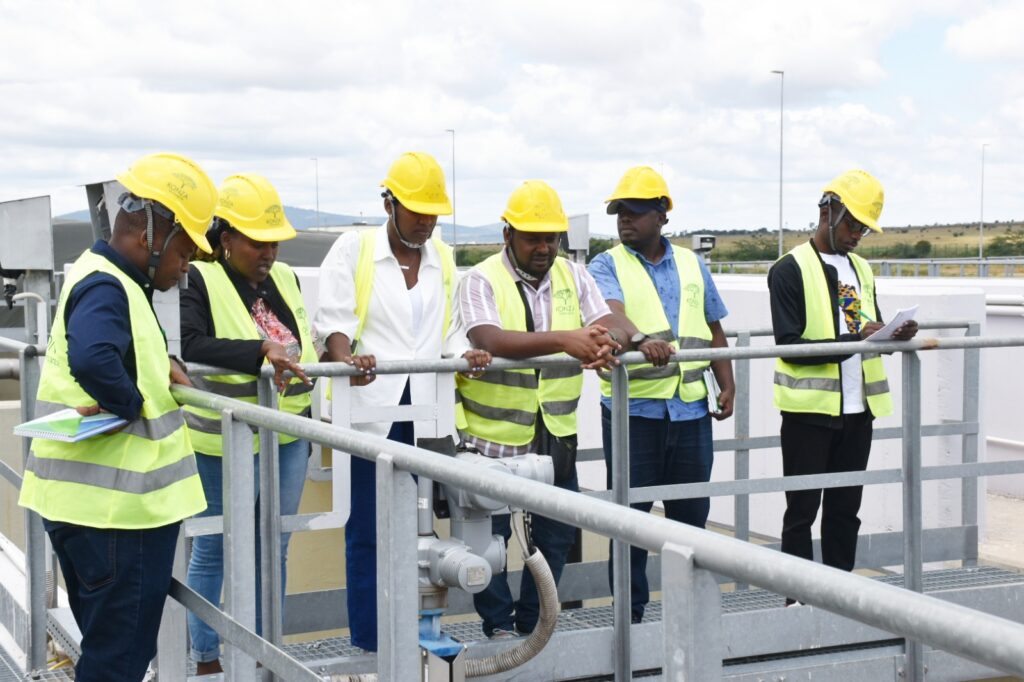
CONCEPT NOTE
INTERNATIONAL TRAINING ON IMPROVING ENVIRONMENTAL PERFORMANCE OF COAL-BASED THERMAL POWER STATIONS
COURSE BACKGROUND
The Environmental Capacities and Sustainability (ECAS) Institute is committed to promoting sustainable environmental management across various sectors, including energy production. Coal-based thermal power stations continue to be a major source of energy worldwide, but they also pose significant environmental challenges, such as air pollution, high water consumption, and carbon emissions.
As part of its mission to enhance environmental capacities and promote sustainability, ECAS has developed this specialized training course to equip professionals in the power sector with the knowledge, skills, and tools needed to improve the environmental performance of coal-based thermal power plants. This course is designed to address the urgent need for cleaner production techniques, stricter regulatory compliance, and more efficient resource management in coal-based power generation.
Through this training, ECAS aims to support energy sector professionals, policymakers, and environmental specialists in implementing advanced pollution control technologies, sustainable operational practices, and regulatory compliance strategies. The course integrates global best practices, case studies, and innovative solutions to help coal power stations align with modern environmental standards while ensuring energy efficiency and sustainability.
COURSE OBJECTIVES OF THE TRAINING
This course aims to:
- Provide an in-depth understanding of environmental challenges in coal-based thermal power stations.
- Equip participants with advanced strategies for emission control and waste management.
- Enhance knowledge of air and water pollution control technologies for coal power plants.
- Strengthen understanding of regulatory frameworks and compliance with environmental laws.
- Promote energy efficiency and cleaner production techniques in power plant operations.
- Explore sustainable coal technologies and carbon capture solutions.
- Foster stakeholder engagement and corporate environmental responsibility in the power sector.
WHAT YOU WILL LEARN
By the end of this course, participants will be able to:
- Identify and assess key environmental risks in coal-based thermal power stations.
- Implement air pollution control technologies to reduce SO₂, NOₓ, and particulate matter emissions.
- Develop water and waste management strategies to minimize environmental impact.
- Ensure compliance with environmental regulations and emission standards.
- Optimize energy efficiency in coal-based power generation.
- Integrate cleaner coal technologies such as carbon capture and storage (CCS).
- Apply best practices in environmental monitoring and reporting.
- Enhance corporate sustainability efforts through cleaner production and stakeholder engagement.
DURATION AND PROGRAM
TARGET PARTICIPANTS
This course is designed for professionals involved in the operation, regulation, and environmental management of coal-based thermal power stations. It is particularly beneficial for power plant managers, environmental officers, engineers, regulatory officials, and sustainability experts seeking to improve environmental performance. Additionally, it is valuable for government agencies, policymakers, researchers, and consultants working on energy and environmental sustainability. The training is ideal for individuals looking to align coal power operations with modern environmental standards while ensuring energy efficiency and regulatory compliance.
TRAINING MODULES
The course is structured into modules that provide a step-by-step approach to understanding, assessing, and implementing best practices in environmental management for coal-based power stations. Each module covers key aspects such as air pollution control, wastewater treatment, solid waste management, regulatory compliance, and sustainable coal technologies. Through a combination of technical knowledge, case studies, and practical applications, participants will develop the skills needed to enhance environmental performance in coal-fired power plants.
| No | Module | Details | |
| 1. | Environmental Challenges of Coal-Based Thermal Power Stations |
|
|
| 2. | Air Pollution Control Technologies and Emission Reduction |
|
|
| 3. | Water and Wastewater Management in Coal Power Plants |
|
|
| 4. | Solid Waste Management and Ash Utilization |
|
|
|
5.
|
Regulatory Compliance and Environmental Monitoring |
|
|
| 6. | Energy Efficiency and Sustainable Operations in Coal Power |
|
|
| 7. | Case Studies and Practical Applications |
|
|
TRAINING STYLE
This course uses a practical and interactive training approach to ensure participants gain both theoretical knowledge and hands-on experience. Expert-led lectures provide in-depth insights into environmental challenges and mitigation strategies, while case studies and group discussions allow participants to analyze real-world scenarios. Workshops and practical exercises focus on key topics such as pollution control, waste management, and regulatory compliance, ensuring participants can apply their knowledge effectively.
Additionally, scenario-based simulations help participants develop problem-solving skills for managing environmental risks in coal-based power plants. The course also includes regulatory and policy analysis, helping professionals navigate compliance requirements and sustainability frameworks. Through stakeholder engagement and role-playing activities, participants learn how to effectively communicate environmental strategies and implement sustainable practices. These diverse training methods create an engaging and impactful learning experience, enabling participants to enhance environmental performance, regulatory compliance, and sustainability efforts in coal-based thermal power stations.
GENERAL NOTES
- Training manuals and additional reference materials are provided to the participants.
- Upon successful completion of this course, participants will be issued with a certificate.
- We can also do this as a tailor-made course to meet organization-wide needs. Contact us to find out more: info@ecasiafrica.org.
- Payment should be sent to our bank account before the start of training and proof of payment sent to: info@ecasiafrica.org.
ABOUT ECAS INSTITUTE
The ECAS Institute designs and delivers independent and targeted training, research, and consulting services. Our work focusses on climate change and resilience building, carbon markets, renewable energy, nature-based solution, biodiversity conservation, agriculture and food systems, We are located in Nairobi Kenya and work across the African region. We have implemented training and research assignments in Kenya, Tanzania, Uganda, South Sudan, Somalia, Malawi, Rwanda, Congo, and South Africa. Globally, we have supported our partners from the UK, Denmark, Italy, Sweden, Germany, and USA.

